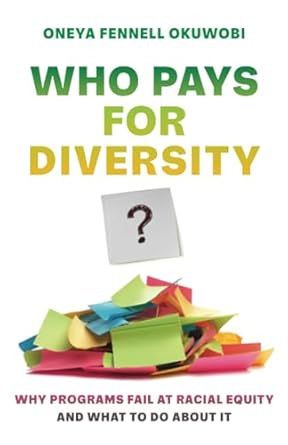Ben Waber reviewed Who Pays for Diversity? by Oneya Fennell Okuwobi
An Absolute Masterpiece
5 stars
This is probably one of the best management books I've ever read. Okuwobi combines insightful analysis with probing, systematic interviews to demonstrate the limitations and costs of organizational diversity initiatives, beginning with the provocation that society might be better off if we scrapped those programs and started from a place that prioritized equity above all else. Starting with the history of corporate diversity programs and how they originally emerged as a legal compromise to more foundational transformation, Okuwobi examines the experiences of people in a wide variety of organizations to demonstrate how foregrounding people who aren't white simply because of their identity profoundly negatively impacts them as well as the organization itself. While I originally thought I wouldn't get much from her inclusion of people who worked in churches, I was surprised at how that unique work environment gave addition insight into this phenomenon.
A minor quibble is that …
This is probably one of the best management books I've ever read. Okuwobi combines insightful analysis with probing, systematic interviews to demonstrate the limitations and costs of organizational diversity initiatives, beginning with the provocation that society might be better off if we scrapped those programs and started from a place that prioritized equity above all else. Starting with the history of corporate diversity programs and how they originally emerged as a legal compromise to more foundational transformation, Okuwobi examines the experiences of people in a wide variety of organizations to demonstrate how foregrounding people who aren't white simply because of their identity profoundly negatively impacts them as well as the organization itself. While I originally thought I wouldn't get much from her inclusion of people who worked in churches, I was surprised at how that unique work environment gave addition insight into this phenomenon.
A minor quibble is that I would dispute Okuwobi's arguments against quantitative metrics - she even suggests some herself that I agree would be more appropriate measures to gain a more macro perspective on what's occurring within organizations. However, the crucial message here still stands - quantitative metrics are never enough, and even if one metric looks good you have to continually increase the depth and complexity, acknowledging that you will be missing something and there are always going to be ways to improve. I would've also liked a bit more on the macro context here, with quantitative metrics to drive this deep qualitative research home.
Regardless, this book is a masterpiece, and should be added to the canon of essential books for those practicing and researching management. Highly recommend

